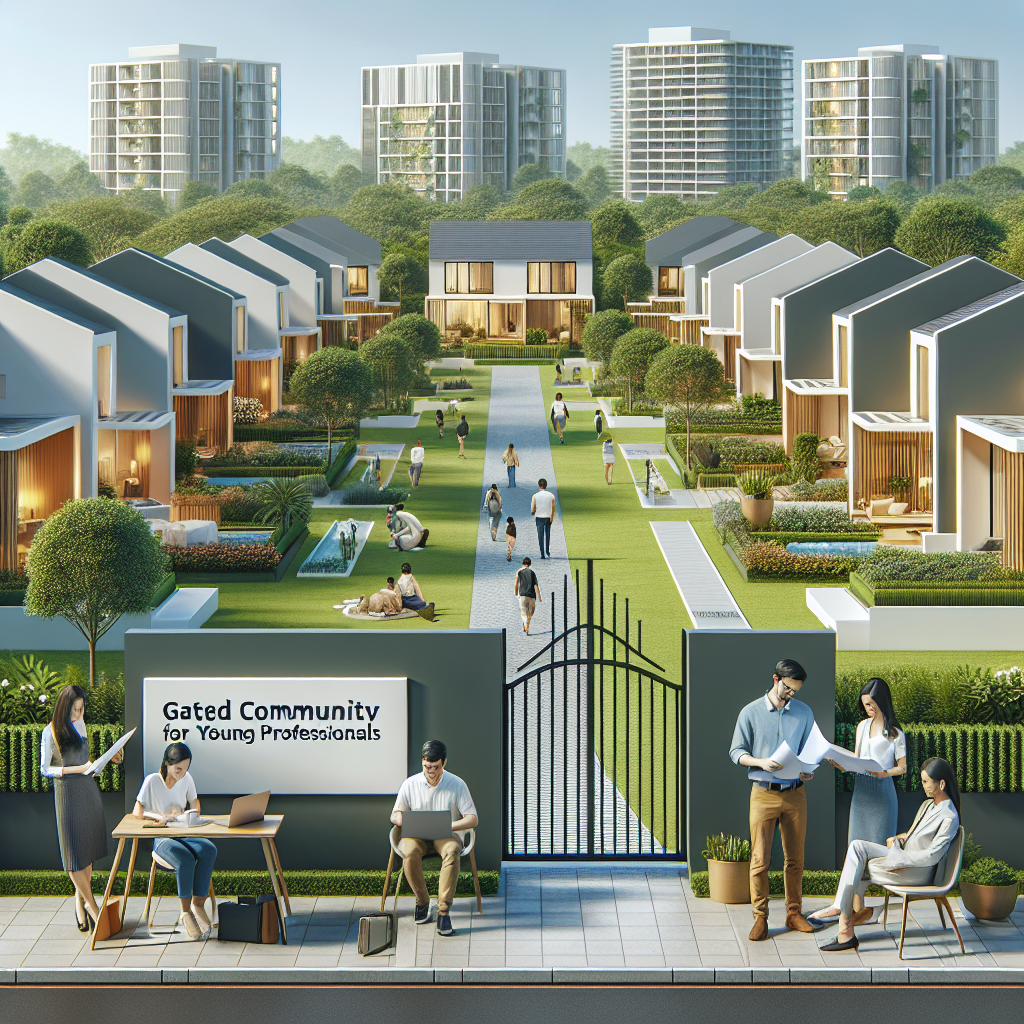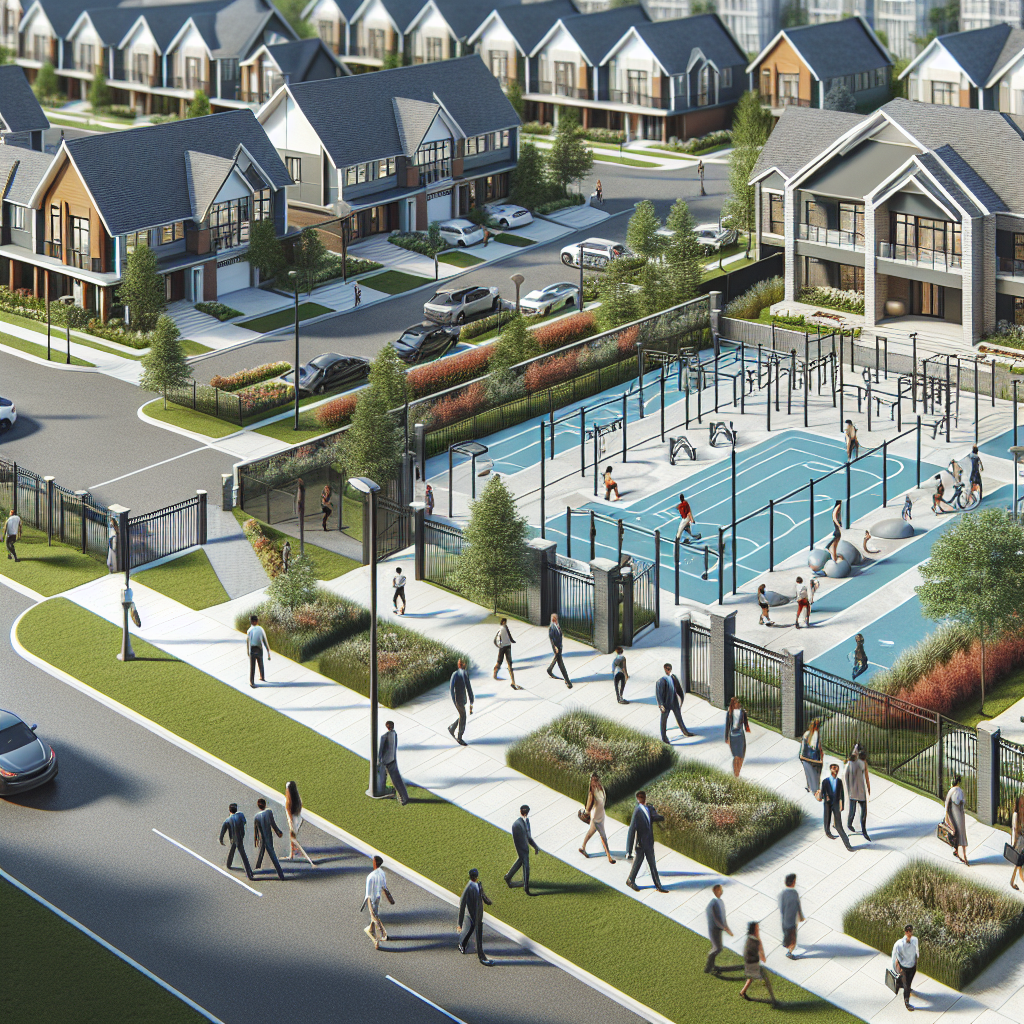Gated communities for young professionals are becoming increasingly popular choices for individuals seeking a unique living experience. These exclusive neighborhoods offer a sense of security, privacy, and community, making them an attractive option for those who value upscale amenities and a high-quality lifestyle. From luxurious housing options to top-notch recreational facilities, gated communities cater to the needs and desires of young professionals looking for a premium living environment. This comprehensive exploration delves into the benefits, features, and advantages of gated communities for the modern millennial workforce, shedding light on the allure and appeal of these exclusive residential enclaves.
Understanding the Appeal of Gated Communities for Young Professionals

– Desire for enhanced security and privacy:
– Gated communities offer a heightened sense of security compared to traditional neighborhoods, with restricted access points and round-the-clock security personnel.
– Young professionals often prioritize safety and privacy, making gated communities an attractive option for those seeking a secure living environment.
– The controlled entry and surveillance systems in gated communities provide residents with peace of mind and a sense of protection for themselves and their belongings.
-
Access to exclusive amenities and communal spaces:
- Gated communities typically boast a range of upscale amenities such as fitness centers, swimming pools, tennis courts, and walking trails, catering to the active lifestyles of young professionals.
- These exclusive facilities offer residents the opportunity to socialize, exercise, and relax without having to leave the confines of their gated community.
- The presence of well-maintained communal spaces encourages a sense of belonging and encourages interaction among residents, fostering a tight-knit community atmosphere.
-
Sense of community and belonging:
- Living in a gated community often provides young professionals with a built-in social network, as residents share similar lifestyles, interests, and values.
- Community events, such as holiday parties, fitness classes, and book clubs, create opportunities for residents to connect and forge meaningful relationships with their neighbors.
- The strong sense of community within gated neighborhoods can combat feelings of isolation and promote a supportive environment where residents feel like they belong and are part of a larger, interconnected community.
Factors Influencing the Decision to Choose a Gated Community
Gated communities have become increasingly popular among young professionals due to a combination of factors that cater to their specific needs and preferences. These factors play a crucial role in influencing the decision-making process when considering a move to a gated community.
-
Safety and Security Considerations:
Young professionals often prioritize safety and security when choosing a place to live. Gated communities offer an added layer of protection with controlled access points, security patrols, and surveillance systems. These measures provide residents with a sense of security and peace of mind, allowing them to focus on their careers and personal pursuits without worrying about their safety. -
Lifestyle Preferences and Amenities Offered:
Gated communities are known for providing a range of amenities that cater to the lifestyle preferences of young professionals. From fitness centers and swimming pools to tennis courts and social gathering spaces, these communities offer a variety of recreational facilities that promote a healthy and active lifestyle. Additionally, some gated communities may also have on-site services such as concierge assistance, maintenance support, and community events that enhance the overall living experience for residents. -
Investment Potential and Property Value Appreciation:
For young professionals looking to make a smart real estate investment, gated communities can offer attractive opportunities for property value appreciation. The exclusivity and desirability of gated communities often lead to a higher demand for housing within these developments, resulting in a potential increase in property values over time. This can be appealing to young professionals who see their home not only as a place to live but also as a long-term investment that can yield financial returns in the future.

Key Considerations Before Investing in a Gated Community Property
When contemplating the purchase of a property within a gated community, there are several crucial considerations that young professionals need to carefully evaluate to make an informed decision. These key considerations serve as fundamental pillars in the decision-making process and can significantly impact the overall living experience within the gated community.
Financial Implications and Budgeting for Associated Costs
-
Initial Investment: Young professionals should assess the financial commitment required for purchasing a property in a gated community, considering not only the down payment but also any additional fees or costs associated with the purchase.
-
Monthly Maintenance Fees: It is essential to understand the monthly maintenance fees charged by the gated community association. These fees typically cover expenses such as security services, landscaping, and maintenance of common areas.
-
Reserve Funds: Evaluating the financial health of the community association’s reserve funds is crucial. Sufficient reserve funds indicate financial stability and the ability to cover unexpected expenses without significantly impacting residents.
Evaluating the Reputation and Management of the Gated Community
-
Community Atmosphere: Researching the reputation and atmosphere of the gated community is essential. Young professionals should consider visiting the community, interacting with current residents, and attending community events to gauge the overall ambiance and lifestyle.
-
Management Efficiency: Assessing the effectiveness of the community association’s management is vital. Efficient management ensures that rules and regulations are enforced, common areas are well-maintained, and residents’ concerns are addressed promptly.
-
Long-Term Sustainability: Understanding the long-term sustainability of the gated community is crucial. Factors such as property appreciation, demand for housing in the area, and the community’s reputation can impact the property’s value over time.
Understanding the Rules and Regulations of the Community Association
-
Covenants and Restrictions: Reviewing the covenants, conditions, and restrictions (CC&R) enforced by the community association is imperative. These rules dictate acceptable behavior, property maintenance standards, and architectural guidelines within the community.
-
Amenities and Services: Familiarizing oneself with the amenities and services offered by the gated community is essential. Whether it’s a fitness center, swimming pool, or communal gathering spaces, understanding what the community provides can influence the overall living experience.
-
Community Engagement: Assessing the level of community engagement and involvement among residents is important. Active community participation can enhance social connections, networking opportunities, and overall satisfaction with living in the gated community.
Exploring the Different Types of Gated Communities Available
In the realm of gated communities for young professionals, there exists a diverse array of options catering to varying preferences and lifestyles. Understanding the nuances of each type can significantly impact the decision-making process when considering investing in a gated community property.
Traditional Suburban Gated Communities
- Characteristics: These gated communities are typically situated on the outskirts of urban centers, offering a serene and secluded environment for residents. They often feature single-family homes with spacious yards, recreational facilities like golf courses or tennis courts, and a strong sense of community.
- Benefits: The appeal of traditional suburban gated communities lies in their emphasis on privacy, security, and a family-friendly atmosphere. They provide a peaceful retreat from the hustle and bustle of city life while fostering a close-knit neighborhood ambiance.
Urban Gated Communities in Metropolitan Areas
- Characteristics: Contrasting with their suburban counterparts, urban gated communities are strategically located within or near bustling city centers. They predominantly consist of high-rise condominiums or townhouses, offering a sophisticated and contemporary living experience.
- Benefits: Young professionals gravitate towards urban gated communities for their proximity to employment hubs, cultural amenities, and vibrant nightlife. The allure of a secure and exclusive enclave within a dynamic urban setting appeals to those seeking convenience and connectivity.
Mixed-Use Developments Combining Residential and Commercial Spaces
- Characteristics: Mixed-use gated communities integrate residential properties with commercial establishments such as shops, restaurants, and office spaces. This innovative approach creates a self-contained environment where residents can live, work, and socialize within the confines of the gated community.

- Benefits: The synergy of residential and commercial elements in mixed-use developments offers a convenient and holistic lifestyle for young professionals. It fosters a sense of community engagement, promotes walkability, and enhances the overall quality of life by providing diverse amenities at residents’ fingertips.
Navigating the Pros and Cons of Living in a Gated Community
Benefits of heightened security measures and controlled access
- Enhanced Safety: Gated communities offer a sense of security through restricted entry points and surveillance systems, reducing the risk of crime and unauthorized access.
- Peace of Mind: Knowing that access to the community is monitored can provide residents with a greater sense of peace and privacy, especially for young professionals living alone.
- Property Value: The perceived safety and exclusivity of gated communities can positively impact property values, offering potential long-term financial benefits.
Potential drawbacks such as restrictions on personal freedoms
- Limited Accessibility: Some gated communities may have strict entry and exit regulations, which could inconvenience residents in terms of receiving guests or deliveries.
- Privacy Concerns: Constant monitoring and restricted access can feel invasive to some individuals, potentially leading to feelings of being constantly watched or controlled.
- Lack of Diversity: Gated communities may homogenize the demographic makeup of residents, limiting exposure to a diverse range of backgrounds and perspectives.
Impact on social interactions and community engagement
- Community Cohesion: The controlled environment of a gated community can foster strong bonds among residents, leading to a close-knit community where neighbors look out for one another.
- Social Exclusivity: The closed nature of gated communities can inadvertently create barriers to interaction with individuals outside the community, potentially limiting social networks.
- Amenities and Activities: Gated communities often offer exclusive amenities such as pools, gyms, and social events, promoting opportunities for networking and building relationships within the community.
Addressing Common Misconceptions About Gated Communities
Gated communities often face criticism and misconceptions that can overshadow the benefits they offer to residents. By addressing these common misunderstandings, a clearer picture emerges of the diverse and dynamic nature of these living environments.
- Dispelling myths regarding exclusivity and elitism
One of the most prevalent misconceptions about gated communities is the belief that they are exclusive enclaves reserved for the wealthy elite. While some gated communities may cater to higher-income individuals, many are surprisingly diverse in terms of socio-economic backgrounds. Young professionals from various income brackets are increasingly choosing gated communities for the safety and amenities they provide, debunking the notion of exclusivity.
- Clarifying the misconceptions about homogeneous demographics
Another misconception is the assumption that gated communities are homogenous in terms of demographics. Contrary to popular belief, these communities often boast a mix of residents from different age groups, professions, and cultural backgrounds. Young professionals seeking a sense of community and security can find like-minded individuals in gated communities, fostering a vibrant and inclusive living environment.
- Highlighting the diverse range of residents and lifestyles within gated communities
Gated communities offer a spectrum of lifestyles and amenities to cater to the diverse needs of their residents. From single professionals looking for a safe and convenient living space to young families desiring a close-knit community for their children, gated communities provide a range of housing options and recreational facilities. The variety of residents and lifestyles within gated communities challenge the stereotype of uniformity, showcasing the richness and diversity present in these modern residential settings.
FAQs about Gated Communities for Young Professionals
What are gated communities for young professionals?
Gated communities for young professionals are residential neighborhoods that are typically enclosed by a security gate with access restricted to residents and invited guests only. These communities often offer amenities such as fitness centers, swimming pools, and recreational areas. They are popular among young professionals for their safety and sense of community.
What are the advantages of living in a gated community as a young professional?
Living in a gated community as a young professional has several advantages. These communities often offer increased security and privacy, as well as a sense of exclusivity. Additionally, many gated communities provide amenities such as fitness centers, swimming pools, and parks, making it easy for residents to relax and socialize without leaving the neighborhood.
Are gated communities for young professionals expensive?
Gated communities for young professionals can vary in price depending on their location, amenities, and size. While some gated communities may be expensive, there are also more affordable options available. It is important to research different gated communities and consider your budget before making a decision.
How can I find a gated community for young professionals that suits my needs?
To find a gated community for young professionals that suits your needs, start by researching different communities in your desired location. Consider factors such as amenities, security, proximity to work, and overall atmosphere. Visit potential communities in person, speak to current residents, and tour available homes to get a feel for the neighborhood before making a decision.
What should I consider before moving into a gated community as a young professional?
Before moving into a gated community as a young professional, consider factors such as the monthly homeowners’ association fees, rules and regulations of the community, proximity to work and amenities, and the overall atmosphere of the neighborhood. It is important to thoroughly research and visit potential communities to ensure that it aligns with your lifestyle and preferences.